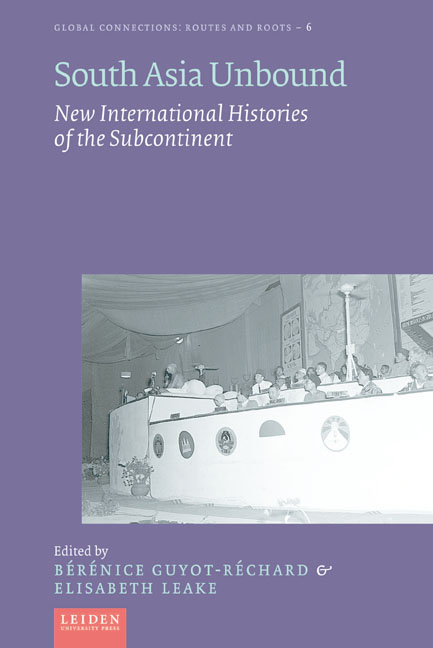Book contents
- Frontmatter
- Contents
- List of Illustrations
- List of Contributors
- Acknowledgements
- Acronyms and Abbreviations
- Introduction. South Asia Unbound
- Part I (Inter)national Orders and State Futures
- Part II From the Transimperial to the International: Lived Uncertainties
- Part III South Asian Roots of the International
- Part IV Ambivalences and Sensibilities of Internationalism
- Afterword
- Index
Afterword
Published online by Cambridge University Press: 04 January 2025
- Frontmatter
- Contents
- List of Illustrations
- List of Contributors
- Acknowledgements
- Acronyms and Abbreviations
- Introduction. South Asia Unbound
- Part I (Inter)national Orders and State Futures
- Part II From the Transimperial to the International: Lived Uncertainties
- Part III South Asian Roots of the International
- Part IV Ambivalences and Sensibilities of Internationalism
- Afterword
- Index
Summary
Abstract The afterword considers the overall contribution of the book against the backdrop of the existing scholarship on the international history of South Asia.
Key words: internationalism, decolonization, South Asia, non-Western international relations
This volume has focused on two central questions. How do we plot the contours of modern South Asia's interactions with the wider world? And how do we conceive of the idea of internationalism in this context? These questions and the answers proffered in this volume are the product of the collective deliberation of a younger generation of scholars who want to write “New International Histories of South Asia.” To understand what is distinctive about this volume, we need to juxtapose it with the older historiography that it seeks to leave behind.
For a start, we may remind ourselves that international history has been the Cinderella of modern South Asian history. Given the extraordinary sophistication of this broader historiography over the past three decades – especially, in social, cultural, and environmental histories – it is striking that South Asia's engagements with the world, beyond the imperial connection, have hardly attracted scholarly attention. Indeed, the historiography of modern South Asia has, for the most part, remained stubbornly insular. After some early works in the 1950s and 1960s, the external engagements of the Raj largely fell out of view, as historians moved on to Indian nationalism. The postcolonial period and its international dimension was deemed too recent in time to merit historical treatment. Indeed, the only aspect of South Asia's international history that drew sustained interest in the next couple of decades was the Sino-Indian frontier – the dispute over which had led to the war of 1962.
Ironically, the revival of interest in the region's international history, especially in the late-colonial and postcolonial period, had to await the opening of official and diplomatic archives in Britain and the United States. This led to several important studies of South Asia's relations with these countries, especially at the time of decolonization and the early Cold War. These books were cast as “international” or diplomatic history, focusing on the making and makers of foreign policies and diplomatic maneuvers. Drawing all but exclusively on foreign archival materials, these studies could do only limited justice to the concerns and perspectives of the South Asian actors.
- Type
- Chapter
- Information
- South Asia UnboundNew International Histories of the Subcontinent, pp. 311 - 316Publisher: Amsterdam University PressPrint publication year: 2023

